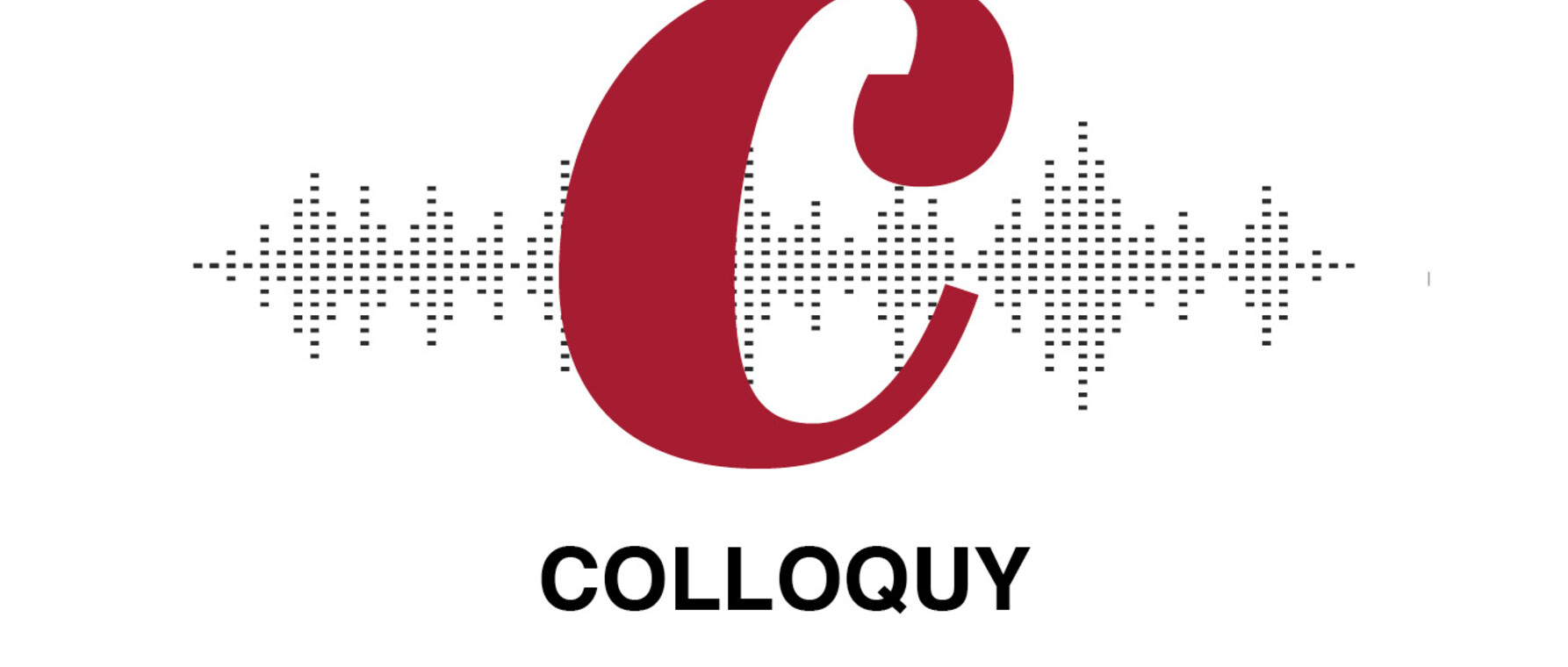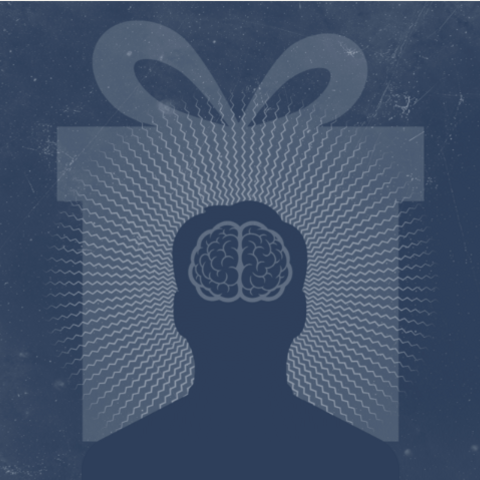Colloquy Podcast: The Graduate Student Mental Health Crisis

“Harvard students are experiencing rising levels of depression and anxiety disorders and high and widespread levels of anxiety, depression, loneliness, and other conditions.” So wrote the authors of the July 2020 report of Harvard University's Task Force on Managing Student Mental Health. Co-chaired by GSAS Dean Emma Dench, the task force reported that nearly one in four graduate students surveyed exhibited symptoms of moderate to severe depression. Nearly one in four exhibited symptoms of moderate to severe generalized anxiety. Underrepresented minority students, first-generation students, low-income students, and students who identified as LGBTQ all were more likely to screen positive for these conditions.
This month on Colloquy, we're taking a deep dive into the graduate student mental health crisis with Dr. Emily Bernstein, PhD ’20, a clinical psychologist at Massachusetts General Hospital's Center for Digital Mental Health. In 2018 while still at GSAS, Dr. Bernstein and her cohorts piloted a successful group intervention for her fellow graduate students that’s still offered today. Since graduating, she’s continued to research and write about new approaches to treatment and prevention. Dr. Bernstein discusses that work, the challenges faced by graduate students, and why she thinks our smartphones could become an important vehicle for delivering mental health care.
This transcript has been edited for correctness and clarity.
Can you describe the landscape of the burgeoning youth mental health crisis? What's the scope, and when did the numbers start to spike?
We've known, actually, for years now that rates of mental health problems are increasing in younger cohorts, and also that the age of onset for a lot of these disorders like depression, anxiety, and trauma are actually getting younger and younger, which is why we're seeing an increase in how many youths, young adults, are seeking help. And I think the crisis even goes beyond these numbers because in addition to there being more young folks who need help and who are actually seeking help, which is great, there simultaneously is a shortage of mental health providers, and that shortage is only getting worse. So increasing rates of need and decreasing availability of mental health providers are leading to a crisis right now.
There are a lot of factors influencing these numbers. For example, we're getting better and better at detecting mental health problems, diagnosing mental health problems, and reaching individuals who previously might not have had access to these services. And so it's hard to know always whether the absolute rate is increasing, or whether it's the rate [of diagnosis] that is increasing, and we're finding more people who we might not have found before. But I think the data is clear that this has been a steady and rising problem for quite a while now.
You and your colleagues from Harvard and Mass General wrote that graduate students appear to be particularly vulnerable to developing or worsening psychopathology. Do we know why they're at increased risk?
I think that there are a lot of reasons why graduate students are particularly vulnerable because of the unique experience. And I can speak to this having just gone through six years of being a graduate student.
When you think about the typical graduate student, they're in their 20s and 30s, and this is a period with major life transitions that can be exciting, but also really stressful. Graduate students often have to move cities, states, even countries. They are getting into and out of serious relationships and thinking about starting families. Many graduate students already have families or start families while they're in school, and this is coupled with a lot of stress in their academic studies.
So when you're in graduate school, there is a lot of uncertainty. There often aren't clear bars for what success or good progress looks like, and there's a lot of uncertainty at the other end. A lot of students go into graduate studies wanting to be professors, and we know that there's a real shortage of those positions these days. And on top of that, whether it's by design or not, there can be a lot of competition, or at least social comparison, in these graduate programs, which adds a lot of stress on top of these big life transitions and uncertainty.
You add that, unfortunately, it's low pay, and so you spend a lot of years with a pretty low income, which can also impact some of these issues like housing, starting a family, and thinking about your future directions. And there's a lot of rejection and setbacks in academia that you're experiencing pretty constantly, and part of graduate school is trying to get used to that in a way. Moreover, a lot of graduate students describe feeling a lot of pressure from their institution or even their advisors—again, not always intentionally. But there's this sense that you need to be really productive, really resilient, and that if you're feeling stressed or down or anxious, it implicitly means that you can't hack it, or there's something that you're doing wrong, and I think that can kind of double down on the stress that students are already feeling.
So, when you bring all of these different factors together, graduate school is really intense, and students often feel like they're facing these struggles alone because unlike when you're a college student and you have a class of a few hundred or even a few thousand peers, in graduate school, you can be in a class of four, like I was when I started. And so even the most supportive program can also sometimes feel pretty lonely.
Paul Massari: What you’re describing is in line with the report of Harvard’s Task Force on Managing Student Mental Health: the isolation, the open-ended nature of graduate study, the concerns about the future of their career and positions in academia, and, of course, financial pressures. One other thing the task force mentioned was imposter syndrome. What’s the impact of that on student mental health—the feeling that the admissions office must have made a mistake?
It feels ironic that I forgot to mention imposter syndrome as a source of stress for graduate students, given that I know I felt a lot of imposter syndrome when I was even asked to do this interview. A lot of students feel like their success up until this point has just been luck, and they can't possibly stack up compared to all of their peers doing these amazing things, and just any day now, they're going to be found out. That's really the experience of imposter syndrome.
I know I feel it. It's something I'm still working on. And in a place like Harvard where your peers are the best of the best—and I know I'm constantly in awe of the other scholars that I went to school with—it's tough.
Now that we've got the scope of the problem, how likely are graduate students to be aware of pathology in their lives and to seek treatment for it? And for those who don't seek treatment, what keeps them from doing so?
I think oftentimes students aren't aware that something is off because maybe they don't look like what in their mind someone who is depressed or anxious looks like. They also may never have been in an environment before, or a community before, where people are talking about this or been in a place where a doctor ever did an assessment to see if they were at risk for one of these conditions or experiencing symptoms of these conditions.
And so I think some students are very aware and are actively seeking help. I think some students don't really know what mental health means or who to go to to find out. And then I think on top of that, access is also a huge problem. So even if you know that something is wrong, even if you want support, it's not always easy to find it. Waitlists are higher than they've ever been for psychiatry clinics, and therapists, and so it becomes a complicated issue when you talk about how many students are seeking treatment because even the numbers who are actively in treatment probably don't tell the full story.
GSAS students are very high-functioning Do you think that works against them recognizing and then seeking treatment for mental health concerns?
Absolutely. We heard this a lot from students that we've talked to in our focus groups or informally after the workshops that we've done, that a lot of students have had the thought that my problems aren't serious enough to need help. There are people out there who have it way worse than me, so I really couldn't get help, or I'd be taking that spot from someone else, or maybe no one would even see me because it's not bad enough. And I think what you described is exactly that, that students are still often achieving at unbelievably high levels, but that doesn't mean that you couldn't benefit from support. And also, productivity isn't the only metric of well-being, and so I think there's a lot of room for just educating students, helping students understand what resources are available to them, and just normalizing that you can be productive and be struggling at the same time.
Let's talk about treatment. You’ve studied cognitive behavioral therapy. What is it? Does it work? And what are some of the drawbacks of the single diagnosis approach traditionally used with CBT?
Cognitive behavioral therapy (CBT) is a family of therapeutic approaches that have been adapted to treat a wide range of psychopathology. These can look pretty different across different disorders, but generally, they have two key components. One piece is the cognitive part, which is looking at the way we think and how that influences our emotional experience of the world and trying to help people develop more adaptive ways of thinking. And then the behavioral piece is just that—looking at behavioral patterns that people get stuck in that tend to make them feel worse rather than better, and trying to help them challenge those patterns and develop new ways of approaching their emotional experiences.
And so historically, cognitive behavioral therapies have been developed to target really specific diagnoses. And I should say that amazing treatments have been developed this way. That we have gold-standard therapies that really work for a lot of people for social anxiety, panic disorder, major depressive disorder, and bipolar disorder. The list just goes on and on. And again, these treatments really do work, and for a lot of people looking for help, targeting a single diagnosis in this way is the right solution.
But this isn't the solution for everyone, and we can also run into problems with this approach when we're trying to think about scalability, and scalability means trying to reach many more people way more efficiently. Because again, there's a shortage of providers, and so we need to use our resources more efficiently and an issue we run into is that many people don't come into our clinics with just one diagnosis. That it's more often than not that people have multiple concerns.
Also, we would love to work with people before they reach the threshold of having a disorder. If we can nip something in the bud, it can be a lot quicker and just lead to better outcomes for people. And so, if someone has two, or three diagnoses, or if they don't quite meet the criteria for a specific diagnosis yet, what do you do for them? How do you decide what manual to take off your shelf to try first?
So in the past few decades, a lot of incredible researchers have started to think in terms of transdiagnostic approaches. And so transdiagnostic means approaches that cut across disorders, so looking for symptoms or processes that can apply to people, whether they're feeling depressed or anxious, whether they've had traumatic experiences, and try to help them more generally. We can reach people, again, who don't have just one disorder or don't meet criteria for something quite yet. It's a little bit more of a flexible approach, and the hope is that it can also be more efficient.
With the cognitive piece, there are common ways of thinking that cut across disorders. So when people tend to feel depressed or anxious, we often see that they have overly negative and rigid styles of thinking. For instance, we often see black and white thinking, right? “If I didn't do my best, then I'm a failure.” And so, if we can teach people to catch that kind of thinking and to challenge it, they can take that skill and apply it to whether the thought is more depressive or more anxious.
This is probably an oversimplification, but sometimes I think about it in the way that when we're growing up, we learn that an ice pack is really helpful if you've tweaked a muscle. And so whether you've overused your elbow playing tennis, or you rolled your ankle on the basketball court, or you're sore for no reason, you can take an ice pack out and can be pretty confident that it will help. And after you've tried that, you can see if any pain is left and maybe you need to try something else out, but oftentimes that alone can be a really helpful intervention.
When you were still at GSAS, you and your colleagues piloted a group intervention based on the transdiagnostic approach to educate students here about mental health concerns. Can you talk about that? How did you design the intervention and what were its goals?
Yeah, so this work—it's kind of mind-blowing to think about—really started back in 2018 and started because of an initiative by graduate students in the econ department, actually. They went to leadership at Harvard asking for more research on the graduate student experience, asking for resources that were more tailored for them. And as I started hearing more about this initiative they were taking, it struck me that as a graduate student myself who was in a clinical program, my friends and I were in this unique position to maybe help out in a different way.
And so, we—my lab mate, Nicole LeBlanc, and I—along with our advisor, Rich McNally, Paul Barrera from Harvard, and Kate Bentley, who I mentioned, who's at Mass General, put our heads together and tried to think about what we could bring to the table that would be different or complementary to what else the university was trying to do for graduate students. And so, we kind of boiled it down to a few goals. First, we wanted to educate students about their emotional experiences in mental health, hopefully give students an evidence-based vocabulary for understanding what they were going through and enable them to talk about it.
We wanted to equip students with skills, so thinking about our peers as scientists, scholars, academics who are really problem-oriented, and action-oriented. We wanted to give them concrete skills that they could take with them and implement in their lives. And again, we really wanted to make sure that this was evidence-based, so as academics ourselves, we drew from cognitive behavioral therapy, and specifically what's called the unified protocol for transdiagnostic treatments of emotional disorders. So we drew heavily from that, trying to pull out what we thought the real core skills were that everyone could benefit from because we wanted to, again, equip students with skills that could help prevent the development or worsening of symptoms, and could even provide some level of early intervention—light touch, but still early intervention—for students who might have already developed some level of symptoms.
So let's break it right down. These are single-session workshops. They're, what, a couple of hours long?
Yeah, so our workshop right now is two hours long. It's broken down into four sections. So we teach four skills for understanding emotional experiences and trying to address emotional habits or patterns that might not be working so well for you. So we do some education about emotions, we teach mindful emotional awareness, some strategies for tackling those overly negative and rigid thoughts, and some strategies for challenging behavioral patterns that might be getting in people's way. The workshop uses a combination of didactics, discussion, and group and individual practice. We keep it really active and engaging.
Graduate students have participated in these workshops for four years now. How are they doing? Do you track participants to see if they're still using the skills that you taught them and what impact it's having?
We have data from the first year, which was our pilot program where students followed up with us immediately after the workshop and then one month and three months later. And then in the third year of our program, which was right in the middle of the COVID-19 pandemic, everything was on Zoom. We have follow-up data up to six months after the workshop. And what we did find was that the vast majority of students report that they continue using skills from the workshop at least some of the time during a typical week up to six months later, which was really encouraging.
Of course, not everyone is doing well when we follow up with them, which is what we'd expect, just looking at the general population. Symptoms wax and wane, and unfortunately, people have life experiences that we can't predict. But for some students, the workshops seemed to really help. We actually found both times we collected data that on average, participants were doing better after the workshop than they were doing before. And we were really excited to see that continued to be true even during the pandemic. So even as this pandemic has dragged on, students who did this workshop didn't seem to get worse, and if anything, they tended to get better, which was really encouraging to us.
You’ve also done a study on the use of smartphone apps in conjunction with cognitive behavioral therapy. What did you find?
So I'm looking at my cell phone right now. Most of us have phones on us all day long, and so they're just amazing platforms to try to think about new ways to reach patients or the general public in their daily lives in a way that's more flexible, more convenient, and more cost-effective.
For a lot of people, and this includes students that we've talked to, a big barrier to mental health treatment is time. They just don't have time to leave work and travel to an appointment for an hour every week or even every other week or every month. It's just not feasible for them. But if they could open up their phone and do some therapy at eight o'clock at night or on a Saturday morning or during those five-minute breaks in between meetings, it actually would all of a sudden become a lot more feasible for them to get support.
And so, in our group, we've been working with an industry partner to build smartphone apps that lead individuals through cognitive behavioral therapies for a few different disorders. We've done a trial for body dysmorphic disorder, we have an ongoing trial for OCD, and we're starting a trial for depression soon. All of these smartphone apps are what we call guided treatments, which means that a lot of the content is being delivered by the smartphone app, but there is also a human in the loop. So sometimes this can be a licensed therapist who's offering phone calls or virtual sessions or texting with participants. Sometimes this can even be bachelors-level staff who act as coaches to help patients feel more motivated or personalize skills to their individual experience.
When you look at the rising rates of depression and anxiety, it’s easy to feel grim. As we bring the conversation to a close, what makes you feel most hopeful about the future of graduate student mental health?
I think I've felt hopeful this whole time because of the conversations that I've been having with students. The fact that our whole initiative began because students at Harvard wanted to talk about this, they wanted to co-develop programs for themselves, for their peers, and for future students, to me, that was just the most encouraging sign that people are having conversations now that they weren't having even eight years ago when I started graduate school. And I think that's at the level of students themselves, the conversations that they're having with each other, but also conversations that they're now pushing for with faculty, with administrators, that faculty are having with each other, that administrators are having with each other. I think people are talking about this problem in a really different way, and so to me, that's really encouraging because I think that means things will get done, and things are getting done.
At a place like Harvard, there are just so many smart, caring people who are working on this program or on this problem at all different levels, from all different angles, and I think this really mirrors the larger national conversation that's being had. So I'm hopeful that more money is invested into research on these topics, into developing new systems that are more scalable, and really supporting clinicians and other professionals who are on the front lines trying to do this work and really deserve all the support that we can offer them. And I love that people are taking their creativity and their spirit of innovation to try to think about new approaches to this problem that have never been tried before. The fact that we're putting treatments on smartphones, that we're blending social media and social groups with therapy. And there are going to be new ideas that come out tomorrow that I've never even thought of.
So I think the fact that these conversations and these innovations are being encouraged more than ever before makes me really optimistic. And the more I've gotten to talk to students from all different departments and fields over the past few years, the more confident I am that anything we can offer them, they will take and run with it and make it even more successful than we can have imagined.
The Colloquy podcast is a conversation with scholars and thinkers from Harvard's PhD community on some of the most pressing challenges of our time—from global health to climate change, growth and development, the future of AI, and many others.
About the Show
Produced by GSAS Communications in collaboration with Harvard's Media Production Center, the Colloquy podcast continues and adds to the conversations found in Colloquy magazine. New episodes drop each month during the fall and spring terms.
Talk to Us
Have a comment or suggestion for a future episode of Colloquy? Drop us a line at gsaspod@fas.harvard.edu. And if you enjoy the program, please be sure to rate it on your preferred podcast platform so that others may find it as well.
Get the Latest Updates
Join Our Newsletter
Subscribe to Colloquy Podcast
Simplecast





